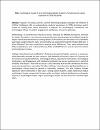Psychological impact of AI on the Undergraduate Student’s Persistence and Career aspiration in STEM disciplines
| المؤلف | Elzayyat, Maram |
| المؤلف | Khawaja, Raabail |
| المؤلف | Naeim, Janatul |
| المؤلف | Taha, Ayah |
| المؤلف | Alabadi, Sara |
| المؤلف | Mohamed, Lina Abdelkarim |
| المؤلف | Bukhari, S.Amna |
| المؤلف | Hassan, Mariam |
| المؤلف | Tiah, Asma |
| المؤلف | Alsaodi, Dimah |
| المؤلف | Almostafa, Tasnim |
| المؤلف | Ahmed, Zubair |
| المؤلف | Muneer, Sumaiya |
| المؤلف | Bhadra, Jolly |
| تاريخ الإتاحة | 2025-01-29T07:32:14Z |
| تاريخ النشر | 2025 |
| اسم المنشور | The Seventh Youth Research Forum 2025 |
| الملخص | Purpose: This study, part of a summer internship program, evaluates the influence of Artificial Intelligence (AI) on undergraduate students' persistence in STEM disciplines and its impact on shaping their career aspirations. It explores AI's psychological, educational, and technological effects on student engagement, satisfaction, and career pathways. Methodology: A comprehensive literature review, following the PRISMA framework, informed the study’s foundation. A structured survey questionnaire was developed and validated using the Delphi method and distributed to undergraduate STEM students via Microsoft Forms. Reliability was tested using Cronbach's alpha, and normality was assessed through the Shapiro-Wilk test. A Mann-Whitney U test was conducted to explore group differences. Data were analyzed using SPSS, and databases such as Web of Science, ERIC, and SCOPUS were used to select the articles and the literature review. Findings: Educational Level and Mother’s Profession showed the highest variances in responses, while Nationality showed the least variance. High Reliability (Cronbach's alpha > 0.7) across the five constructs Educational Effects, Technological Effects, Educational Implications, Technological Implications, and Engagement and Satisfaction indicated the survey questionnaire’s statistical reliability. The Shapiro - Wilk test results (p < 0.05), indicating that the data distribution for these constructs deviates from normality. The Mann-Whitney U test found no significant difference in psychological impact based on gender or nationality. However, first year students showed significant, which diminished in later years. Among Qatari students, males experienced higher psychological impact compared to females, while non-Qatari students displayed no such gender disparity in psychological impact. Higher psychological impact was also observed in students aged 22-25. |
| اللغة | en |
| الناشر | Qatar University Young Scientists Center - Qatar University |
| الموضوع | Artificial Intelligence in STEM education Student persistence and career aspirations Psychological impact of AI on students Educational and technological effects on engagement STEM student survey and data analysis |
| النوع | Conference |
الملفات في هذه التسجيلة
هذه التسجيلة تظهر في المجموعات التالية
-
محور العلوم والهندسة والصحة [80 items ]


